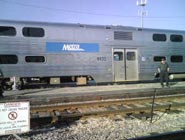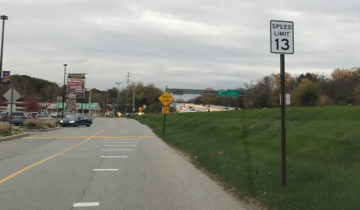Today’s post came via email from another one of our readers, who commutes into Chicago for work. We’re pretty sure this post is sure to draw a lot of comments!
“We are delayed today due to a large passenger load.”

That was the excuse which Metra announced last week on a train heading out of Chicago and into the suburbs – as if the train was delayed and it was the riders’ fault! My translation of this message is, “Next time you want your train to be on time, you had better not be on it! ”
“Whenever Metra hits a pedestrian, they are immediately on the PA reporting having struck trespassers. They report mechanical delays, switch problems, weather delays, grade crossing obstructions and even delays due to prior delays, but they are never late. Only delayed.”
Anyone who has ridden the Metra commuter line in Chicago will be familiar with this kind of message, but we at chickenmonkeydog suspect that this kind of blame game is probably pervasive across all sorts of commuter lines across the globe.
We’d like to thank the reader from Chicago who contributed the idea and photo for this post.





Ah, joy!
This is on par with excuses heard on British rails – ‘leaves on the line/ tracks’, ‘the wrong kind of leaves’ (not making it up!), ‘rain’, ‘sunshine on the tracks’, ‘snow’, ‘previous train was late’ and the latest heard in Oxford ‘someone forgot to fill the choo choo with diesel’..
Creativity is found in all corners of the world I guess 🙂
British ‘trains’ not ‘rails’ :-/
@Shefaly – Yeah, the leaves on the tracks is a great one. How did they think that one up?
I think one of the least creative that I heard was that ‘the rails were too cold’. Really? Rails are too cold? Well, couldn’t they just call the people who run the Transiberian Railroad and ask where they buy their rail tracks from? I am pretty sure it gets cold in Siberia, and trains seem to run there too.
This reminds me of a billboard on the side of one of the highways heading into Chicago. The sign is meant to be read during the morning rush hour when people are stuck in heavy traffic.
It reads “We’re on time. Are you? METRA.”
I always have to laugh because 50% of the time I ride Metra it is late! I wonder what the folks at the Truth In Advertising Agency would have to say about that.
Folks, at least there’s an attempt to give you a reason – however harebrained it may be. We have no such luck here – we’re truly blessed if we’re informed of any delay. Of course, we also factor in delays in our plans, which the railways know we do as well, so I guess it works for everyone!
Cheers,
Quirky Indian
http://quirkyindian.wordpress.com
@ Liam:
How did they that one up? Well, my hypothesis – a lazy driver one hazy autumn morning made it up and it caught on, since it was so innovative 😉
@ QI:
You forgot to apprise Liam and Conall of the wonderful situation in India where the trains may arrive the following day – a delay of 24 hours. I have experience in having travelled on trains running 36 hours late too!
Makes British Rail, Metra etc look Swiss in comparison (which like British trains is privately owned and operated but on time, every time..)
Conall, you know that Metra’s version of “on time” is within 10 minutes of the scheduled arrival or departure time? Apparently that is the “industry standard” which allows Metra to state that certain trains are on time.
The excuses all of you have provided (cold rails, and leaves on the track) and the understanding that really late trains run 36 hours behind make me feel a lot better about my morning commute.
Thanks!
I was on teh train to work the other day and my train was running about 15 minutes late so in an effort to make up that time the conductor announced that we would not be making two of our scheduled stops. How is that helpful to the people at those stations who will be more than 15 minutes late to work because their train to did not come?
@QI + Shefaly –
Whilst I can only imagine the horror stories that riders of the Indian rail system could tell, I’d remind everyone that it costs much less to ride a train in India than in the UK. ‘Wet leaves on the track’ is an expletive bitter pill to swallow when having just shelled out 50 quid for an hour’s return journey. For £50 and wet leaves, I should have driven the car! Ha-ha!
Well, I guess the alternative is to drive in rush hour traffic and waste lots of money on gas, so we should really stop complaining about the train being 10-15 minutes late. Now, if the train is 36 hours late, then you can complain!
@ Liam:
‘Expensive’ is relative 🙂
@ Noel:
“Now, if the train is 36 hours late, then you can complain!”
Like anyone is listening… 😉
I don’t so much have a problem with the constant tardiness of the Metra trains, as with their poor excuses. Still, at least the ridiculous excuses they come up with do make me laugh, which helps pass the extra 15 minutes I spend on the train. And yes, the train is still much better than driving to the city.
@ Shefaly – Your point point about the relativity of cost is valid. So, would a comparably distanced journey in Indian tax an Indian’s wallet at the same level as my 50 mile journey in England taxes mine? (I’m not a mathematician or a statistician, so my choice of language might be wrong, but I am sure you’ll understand my question nonetheless.)
@ Liam:
I would compare fares as % of gross income for comparison. More academic would be to do PPP between gross incomes but ballpark numbers should give us an idea.
A 400km/ 250mile/ approx 5 hours journey between two cities in an a/c chair car seat had cost me Rs. 1400 or so return (approx £ 20) about 2 years ago. If you take a gross income of Rs 75,000 per annum, then this is a fairly large proportion of a regular guy’s monthly post-tax income.
If you do the maths for your commute, you will see if that is comparable. Makes sense?
Another comparison, this one for commutes not long journeys: on the air-conditioned Delhi metro, a 15km/ approx 10 mile journey costs Rs 44 return off-peak (approx £ 0.60). Average income may be higher than in the above example by a factor or 2 to 4 at least.
What do you think?
@ Shefaly – Blimey! That was a thorough answer. I was expecting something like a slightly expanded upon ‘yes’ or ‘no’. I am still working with my calculator in an attempt to respond … Thanks for your thoughts though. I will figure this out at some point today.
@ Liam:
Sorry, as you can see, I have never pondered the question. So a yes/ no answer would have been a guess and probably a dishonest one too.
I was fortunate enough to earn way more than the average salary even when I lived in India. So I never had to ponder it. Now of course, I earn in Pounds and spend in Rupees so I do not stop to assess this.
What can I say? 🙁
The closest answer would be ‘probably’ or ‘depends on whom you ask’ (more accurate).
@ Shefaly – No, no, yours was a very good answer. I was just being lazy and didn’t want to have to think through the answer as completely as you had.
Yes, heavy passenger loading does slow trains down. I work for a commuter rail. The more passengers there are boarding and getting off of a train, the longer it stays at that platform to let the people on and off. An extra minute or two at each station because of more people ads up to as much as 10 to 15 minutes by the time the train reaches the end of the line. It’s not that hard to understand this. Imagine driving your car and having to let one person get in or out as opposed to letting a group of people in or out at a stop. It would slow you down right? It’s just the same with a train trying to board hundreds of people. Go live in a city without commuter trains and see how much you like sitting in traffic everyday. Stop your complaining. You’re lucky to even have the option of taking a train to work.
@ John
Welcome to chickenmonkeydog! Thanks for reading and for your comment. I am actually quite glad to have you here, since it was beginning to feel like a one-sided discussion!
You’re most certainly right that it is clear why additional passengers could cause delays. However, doesn’t it seem reasonable to expect that Metra would measure passenger loads and taken that into consideration when creating a schedule, so they could run on-time with the increased load?
I am glad we do have the commuter rail, but it isn’t as if this service is being provided by some gracious benefactor with no cost to me. Metra is a government funded operation, and I am a resident taxpayer, so I certainly feel like I have the right to expect a certain level of performance from the service. Shouldn’t the solution to heavy passenger load be addition of capacity, not simply placing the blame on the riders?
@ Conall
The previous 2 comments and the phrase “..heavy passenger load” reminds me of a piece of data which suggests that even adjusting for inflation and price fluctuations, the increase in the average American passenger’s weight means airlines are spending a larger % of their operating costs on fuel. So there is more than one way to slice and dice the ‘passenger load’ factor.. 😉
You can bet this train would have monster delays if “heavy passenger load” can be blamed:
http://www.chicagotribune.com/media/photo/2008-11/43162608.jpg
@ Conall
Luckily that train is in India 😉 For more discussion of which, please see above.
The average weight of a passenger in this film is definitely not worthy of being called ‘heavy’. For more references on link between passenger weight and delays and between passenger weight and fuel costs, see above.
Man, the comments section here is immensely valuable isn’t it?
Now that I’m in Chicago and use the Metra, I hear these excuses all the f-ing time.
Choice one: “delayed due to late arrival of equipment (aka train)”. Great. Thanks. Didn’t know that.
BTW, what Metra line do you travel on? I take the MD-N line. The worst, if you ask me. 🙁
@ CheekyMonkey –
I love the attempt to make the blatantly obvious seem more profound: late arrival of equipment. Ha-ha. Fantastic.
Is Metra still running that newsletter? It was the saving grace of the company as it was pretty funny. It might be worth emailing them about it …
I haven’t be on a Metra train in years, but when I did it was either the Northern Line (to Kenosha) or the one that went through Morton Grove (I’m afraid that I can’t remember the name of that line), depending on my schedule.
This is kind of crazy but I have been on 16 consecutive late Metra trains (5 minutes or more) to the Northern Suburbs. My leave time and arrive time varies but so far we’ve been delayed due to:
Heavy Passenger Load
Freight Train Interference
Waiting on Other Trains
Signal Problems
And while I am here, if you are getting off at one of the first stops, don’t sit in the big seat on the top level of the train and make everyone move for you.
@ Metra Man –
Thanks for visiting and for the comment. Welcome, welcome.
As for your Metra woes, I feel your pain. 16 consecutive late trains! That’s ridiculous. I bet Metra would say that 5 minutes behind schedule isn’t late by their measure.
At least you didn’t have a Secret Service Agent causing you a 90-minute delay.
Good tip on seat selection. A little consideration for our fellow passengers can go a long way!
[…] the train there, let alone been to Chicago (any Chicagoans out there, feel free to comment!). A quick look around at some blogs indicate that, as in most cities, their rail system is not without its problems with delays and […]
OK EVERYONE IS HILARIOUS, BUT SOOO CORRECT..IM A NEW METRA RIDER, I TRAVEL FROM VILLA PARK TO DOWNTOWN FIVE DAYS A WEEK, MY TRAIN IS SCHEDULED TO ARRIVE AT 823 AND IN DOWNTOWN @853. NEEDLESS TO SAVE IT NEVER EVA EVA EVA ARRIVE ON TIME AND IM LATE EVERYDAY BECAUSE THE TRAIN ARRIVES DOWNTOWN @ 905 WITHOUT ANY DELAYS..LOL..I THOUGHT CTA WAS BAD BUT I COULD SET MY WATCH BY THE CTA TRAVEL, IN SIMPLE METRA CHARGES MORE, BUT THE SERVICE IS HORRIBLE…I WONDER IF I GET FIRED, CAN I WORK FOR METRA..